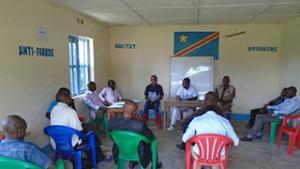Before the iTSCi traceability and due diligence programme was implemented in Shabunda territory, lack of control and monitoring had allowed widespread min-eral fraud, bribery, and other illegal activities to go unreported and unchecked. However, with the scaling-up of iTSCi to this important mineral area, local multi-stakeholder committees called Comités Locaux de Suivi (CLS) were established to safeguard the integrity of the supply chain and help reduce fraudulent activities. These groups, facilitated by iTSCi, and chaired by the local government, meet regu-larly to discuss risks in the 3T mining sector by a wide-range of stakeholders, in-cluding mining cooperatives, state services and security forces, negociants, compa-nies, civil society groups, iTSCi field officers, and others.
Once a fraudulent activity is highlighted and information is verified, stakeholders help to develop and agree mitigation measures to address illegal activities and reduce the probability of recurrence. In Matili, Shabunda in early 2017, a local cooperative alerted iTSCi and the CLS about potential illegal taxation at a security barrier on the road between South Kivu and Maniema province. iTSCi staff helped verify the information and it was also discovered that some untagged minerals had been fraudulently moved by bribing state agents stationed at the barriers. State services including the Mines Division launched investigations and CLS mem-bers increased monitoring, and called for sanctions against the involved agents, who were subsequently transferred and removed from their post.
To increase monitoring further, five additional agents from the Service for Assistance and Supervision of Artisanal and Small-Scale Mining organisation (SAEMAPE) who are responsible for overseeing tagging at mining sites, were deployed to Shabunda sites where a high risk of fraud had been identified. The newly assigned agents were trained extensively by iTSCi on traceability procedures and due diligence principles inorder to help with their work. Since this incident, CLS members have been provid-ing updates on the situation during their regular meetings.
‘Fraudulent activities have significantly decreased with the improved presence of SAE-MAPE agents in Shabunda. All minerals leaving the sites are tagged and transported directly to their recipient’ reported Ntola Kalumuna, a local negociant. At the following CLS meeting, the cooperative and managers of sites where smuggling took place con-firmed that thanks to the measures taken, fraud was no longer observed. Production of tagged minerals at both sites has since increased, benefiting the livelihood of min-ers and their communities and local tax revenues.

Members of the local CLS committee in Matili discussing updates on the fraud incident [Photo: Pact]
